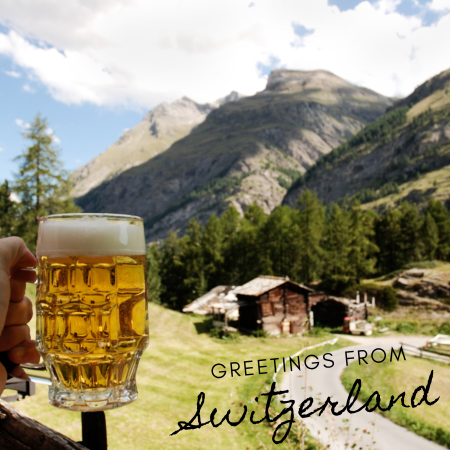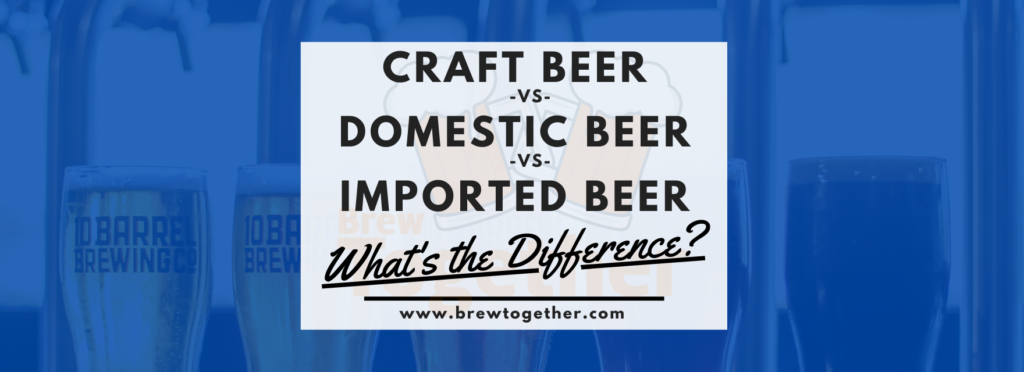Swiss Beer Brands: Best Beers and Breweries from Switzerland


Nestled amidst the majestic Alps, Switzerland is renowned for its picturesque landscapes, precision engineering, and delectable chocolates. Yet, beneath this well-established image lies a rich tapestry of Swiss breweries that have shaped the nation’s palate for centuries. Beer, often overshadowed by the country’s famed wines and spirits, holds a special place in Swiss culture, weaving together tales of ancient rituals, monastic traditions, and modern innovations. This article delves into the fascinating history of Swiss beer, tracing its origins from ancient times to the present day, and spotlighting the iconic brands that have made Swiss beer a global sensation. Here’s our guide to the best Swiss beer brands!


The Ancient Beginnings
Long before Switzerland was recognized as the confederation we know today, its inhabitants had already discovered the art of brewing. Archaeological evidence suggests that as early as the Bronze Age, the regions that would later form Switzerland were home to beer enthusiasts. These ancient brews were a far cry from the refined lagers and ales of today, but they laid the foundation for a brewing tradition that would span millennia.
Crafted from a mix of fermented grains, these early beers were likely cloudy, with a rudimentary taste profile, quenching the taste buds of ancient Swiss people. The lack of hops, which only became a staple ingredient in the Middle Ages, meant that these brews had a shorter shelf life and a distinctly different flavor. Yet, they were cherished, often consumed during rituals, feasts, and daily meals.
The Middle Ages: Monasteries and Breweries
As the centuries rolled on, the art of brewing underwent significant transformations, particularly during the Middle Ages. Monasteries became the epicenters of brewing excellence. Monks, with their meticulous methods and devotion to craft, refined beer recipes and introduced more sophisticated brewing techniques. The secluded walls of these religious institutions hid vast brewing vats where monks experimented with flavors, grains, and fermentation methods.
Outside the monastic confines, small breweries began to sprout across German-speaking Switzerland, catering to the local populace and facilitating the growth of the beer trade. These establishments not only catered to the local populace but also facilitated the growth of beer trade routes. The introduction of hops during this era was a game-changer. This ingredient not only enhanced the beer’s flavor but also acted as a preservative, allowing beer to be stored for longer periods and facilitating its trade across greater distances.
The Modern Era: Industrialization and Innovation
The dawn of the 19th century brought with it the winds of change for the Swiss beer industry. The Industrial Revolution, which swept across Europe, made its mark on Switzerland’s brewing landscape. The introduction of steam-powered machinery and advanced brewing equipment revolutionized the production process, allowing for larger batches and more consistent quality.
The most significant shift during this era was the rise of pale lager, which quickly became a favorite among the best beers in the region. Influences from neighboring European countries, especially the United Kingdom and the Czech Republic, played a role in diversifying the Swiss beer market. While ales, with their top-fermenting yeast, had dominated the Swiss beer scene for centuries, the introduction of bottom-fermenting yeast led to the creation of crisper, clearer, and more refreshing lagers. These beers, with their golden hue and effervescent character, quickly became the drink of choice for many Swiss citizens.
However, this period wasn’t just about large-scale production and lagers. The modern era also saw Swiss brewers looking beyond their borders, drawing inspiration from international beer styles and trends. This global influence led to a diverse range of beers being brewed in Switzerland, from robust stouts to tangy wheat beers.
Yet, even as the industry boomed, it wasn’t without its challenges. The late 19th and early 20th centuries saw a wave of temperance movements across the globe, and Switzerland was no exception.
Prohibition and its Effects
The early 20th century was a tumultuous time for the global alcohol industry. Inspired by the temperance movements in the United States and other parts of the world, Switzerland too grappled with the idea of alcohol prohibition. In 1917, amidst concerns about public health and morality, a federal referendum led to the temporary prohibition of distilled spirits. While beer and wine were spared from this ban, the overall sentiment against alcohol consumption cast a shadow over the Swiss beer industry.
The prohibition on spirits lasted until 1931, but its effects were far-reaching. Many distilleries either shut down or pivoted to producing non-alcoholic beverages. The beer industry, though not directly targeted, faced challenges of its own. A decline in public enthusiasm for alcoholic beverages, coupled with economic challenges, meant that many breweries struggled to stay afloat. Some merged, others diversified their offerings, and a few, unfortunately, closed their doors for good.
However, the resilience of the Swiss beer industry shone through. Post-prohibition, there was a resurgence in beer production and consumption. Local brewers began experimenting with different beers, from sour beers to Belgian-style beer, catering to the evolving tastes of beer lovers. Breweries that had weathered the storm emerged stronger, with a renewed focus on quality, innovation, and marketing. The end of prohibition also paved the way for a more liberal and open approach to alcohol consumption in Switzerland, setting the stage for the beer renaissance that would follow in the latter half of the 20th century.
Swiss Beer Brands: A Closer Look
Switzerland, while not as globally recognized for its beer as some of its European neighbors, boasts a rich tapestry of breweries, each with its unique story and flavor profile. Here’s a glimpse into a few of the most iconic brands in the Swiss market:
Feldschlösschen
Founded in 1876, Feldschlösschen is not just Switzerland’s largest brewery but also one of its most iconic. With its headquarters resembling a grand castle in Rheinfelden, the brand has become synonymous with Swiss beer. Over the decades, Feldschlösschen has consistently produced a range of beers, from crisp lagers to hearty stouts, capturing the essence of Swiss brewing traditions.Not only is it the biggest brewery in Switzerland, but its Feldschlösschen Original is a rich yellow lager that has been a favorite for a long time. The Feldschlösschen Brewery itself stands as a testament to Europe’s finest breweries.
Brauerei Locher AG
Situated in the picturesque town of Appenzell, Brauerei Locher AG is renowned for its Appenzeller Bier. What sets this brewery apart is its commitment to tradition. Using pure Alpine spring water and a blend of local herbs, their beers offer a taste that’s distinctly Swiss. Their Quöllfrisch, a refreshing lager, is particularly popular among locals and tourists alike.
Bière des Franches-Montagnes (BFM)
For those with a penchant for the unconventional, BFM is a revelation. Known for its experimental brews, it’s a haven for those who love sour beers and pale ales .Founded in 1997 in the Jura region, this craft brewery has garnered attention for its experimental brews. From barrel-aged sours to complex ales, BFM pushes the boundaries of brewing, earning accolades and fans worldwide.
Calanda Lager and Einsiedler Bier are other notable Swiss lager beers that have made a mark in recent years, each with its unique taste. While these are just a few of the many breweries that dot the Swiss landscape, they exemplify the diversity, innovation, and passion that define the Swiss beer industry. Each brand, with its unique history and flavor profile, contributes to the rich tapestry of Switzerland’s brewing legacy.


The Craft Beer Movement in Switzerland
In recent decades, the global beer landscape has witnessed a seismic shift. The craft beer movement, characterized by small-scale breweries emphasizing quality, flavor, and traditional brewing methods, has taken the world by storm. Switzerland, with its rich brewing heritage, has been at the forefront of this revolution in Europe.
Rise of Microbreweries
The late 20th and early 21st centuries saw a surge in the number of microbreweries in Switzerland. These establishments, often run by passionate brewers with a deep respect for tradition, began experimenting with flavors, ingredients, and brewing techniques. The result? A diverse range of beers that catered to both traditionalists and adventurers.
In recent years, the craft beer movement has seen a surge in Swiss craft beers like Dr. Brauwolf’s Vanilla Cream Ale. French-speaking Switzerland has also seen a rise in small breweries producing world-class beer.
Swiss Craft Beer Festivals
As the craft beer culture grew, so did the events celebrating it. Festivals like the Zurich Beer Week, Lausanne Beer Celebration, and the Basel Craft Beer Festival became annual highlights, drawing enthusiasts from across the country and beyond. These events not only showcased the best of Swiss craft beer but also provided a platform for brewers to exchange ideas and collaborate.
Influence of Global Trends Beyond Swiss Borders
While Swiss craft brewers are deeply rooted in their local traditions, they’re not immune to global influences. From the hop-forward IPAs inspired by the American West Coast to the rich and creamy stouts reminiscent of Irish traditions, Swiss craft beer is a beautiful blend of local and global flavors. The influence from the Czech Republic and Belgian-style beer trends has also been evident, with local breweries producing beers that rival some of the best in these countries.
The craft beer movement in Switzerland is more than just a trend; it’s a testament to the country’s enduring love for beer. It’s a celebration of tradition, innovation, and the sheer joy of discovering a new favorite brew.
Conclusion
Switzerland, a nation celebrated for its precision watches, alpine landscapes, and rich chocolates, has a lesser-known but equally captivating treasure: its beer. From the ancient brews of prehistoric times to the innovative creations of modern craft breweries, Swiss beer tells a story of tradition, resilience, and passion.
The journey of Swiss beer is not just about the beverage itself, but also about the people who craft it. It’s about the monks who preserved ancient recipes, the brewers who weathered the challenges of prohibition, and the modern artisans who dare to experiment and redefine what Swiss beer can be.
As we raise a toast to the future, one thing is certain: the legacy of Swiss beer is enduring. With each sip, we not only savor the flavors of hops, malt, and mineral water but also the rich history and culture of a nation that has brewed with heart and soul for centuries.
Here’s to the past, present, and future of Swiss beer. Prost!
Thank you!
If you found this article was helpful, please share it with your friends using the social media share buttons below! We need your help getting the word out about BrewTogether!
Leave a comment below or post in the forums! The BrewTogether Community is made up of an awesome group of homebrewers around the world. We are always supportive and happy to help answer your questions about brewing your perfect beer!
If you’re not a member of BrewTogether, we’d love for you to join! BrewTogether is completely free, and signing up is easy! Click here to join! We’d love to have you as a member of the BrewTogether Community!
Now using BrewTogether is easier than ever! Download the FREE BrewTogether Mobile App – available on both the Apple App Store and the Google Play Store! The BrewTogether App is completely free and drastically improves the experience of using BrewTogether on a mobile device.
Affiliate Disclosure: BrewTogether is a participant in the Amazon Services LLC Associates Program, an affiliate advertising program designed to provide a means for us to earn fees by linking to Amazon.com and affiliated sites. BrewTogether is also a participant in an affiliate program with MoreBeer, our favorite online homebrewing equipment/ingredients retailer. Some of the links in this article are affiliate links, which means that if you choose to make a purchase after clicking the link, I will earn a small commission at no additional cost to you. Please feel free to reach out with questions. Thank you for your support!






Responses